
OCEANOGRAPHY 1 LAB (OCAN 1L) -- City College of San Francisco
INSTRUCTOR: Katryn Wiese *|* kwiese@ccsf.edu
CANVAS | Earth Rocks! Videos | (Zero Cost for lab materials/manual)
Want to add the class? Review my add policies
Video | Video w/CC | Script
In this course we will cover a range of oceanographic topics and skills, including nautical chart interpretation, seafloor bathymetry, seawater chemistry, El Nino/La Nina and local upwelling, ocean sediment, coastal processes, and marine life interactions. The class has been designed to maximize your interaction with data, images, and materials from the ocean and inspire your respect and stewardship for it. (OCAN 1L Official Course Outline)
Upon completion of this course a student will be able to:
- Investigate oceanographic phenomena through a variety of scientific inquiry techniques.
- Analyze and evaluate data on the oceans.
- Apply scientific principles, theories, or models to predict and explain the behavior of oceanographic phenomena.
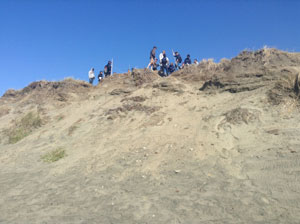
As your instructor, I am committed to finding the most effective ways to engage you with the material and help you to learn. My class formats and teaching methodologies are all designed to help you build your understanding of the material and kick it around and ask questions of me and your fellow students so you can strengthen it.
Through reading material (lab manual + online resources), which you access at your own pace, you will begin the process each week of learning the new material. During the lab, you will refine and strengthen that understanding as you explore the lab topic and materials.
Whether you're taking the class in person or online, learning the material is ultimately up to you and how much time and effort you put in (preparation and practice). I will help and guide you, but I can't simply make you learn. If you're struggling, reach out. I want to help. Welcome!
Class time commitment:
- On average, 6.25 hours/week of work. (FOR FULLY ONLINE CLASSES, THAT'S ALL DONE ASYNCHRONOUSLY; FOR IN-PERSON CLASSES, 4 of those hours happen in the lab and 2 are homework.)
- 3 field trips will take place during the semester -- see class syllabus for schedule (FOR ONLINE CLASSES, THESE WILL BE VIRTUAL; for in-person classes, students must provide their own transportation.)
Prerequisites:
- Advisory: Completion of Geometry and Algebra 2 and completion of or concurrent enrollment in college-level English.
- Required: that you have completed or be co-enrolled in the Oceanography 1 lecture.
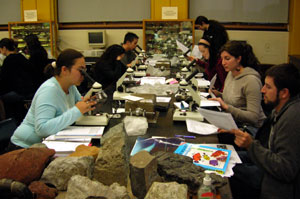
IS THIS THE RIGHT COURSE FOR YOU?
Let's review some of the basic logistics of this course, and then you'll know whether you're ready for a General-Education science laboratory.
- Is this your first science course? Student with the best chance of success in this class are those with a strong background in math and English (it is advised that you have completed Algebra 2 and Geometry and have completed or be co-enrolled in college-level English).
- Are you comfortable with technology?During this semester, you will need:
- Solid internet connection and access to YouTube (any browser, most devices) to access tutorials.
- A camera (phone camera works fine!), so you can upload photos of some of your work.
- Google Mail, Docs, and Photos so you can share photos with your fellow students.
- CANVAS to complete assignments and take some quizzes/exams.
- Do you have enough time in your schedule? The weekly workload for this class is, on average, 6.25 hours per week for 16 weeks, broken down, generally as follows:
- Completing the preparatory reading (~1 hr/week)
- Completing the labs. (~4 hr/week)
- Practicing and reviewing material prior to quizzes/exams (1 hr/week)
- Other miscellaneous activities like accessing additional review resources (textbook and web resources), and communicating with other students and me.
General Education science laboratories are not easy. They really do require consistent effort. Your best chance of success is to have positive and regular engagement with me and your fellow students in class and to keep on task (meeting deadlines and keeping up each week). As your instructor, I will do my best to provide you these opportunities. It will be up to you to step up and engage! I look forward to meeting all of you and having you meet each other.
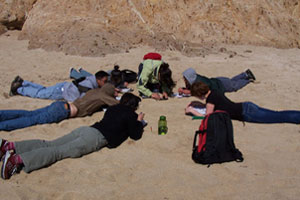
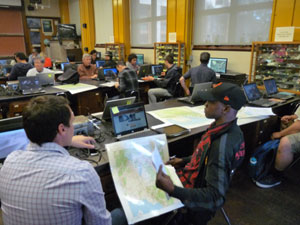
QUESTIONS?
If you have any questions or concerns regarding class format or content, remember your resources are the videos, CANVAS, the lab manual, me, and each other.
- CCSFMail (student Google Mail accounts) instructions and access to many CCSF technology services can be found at MyCCSF.
If you have forgotten your password, log into your myRAM account and find the CCSF Mail password reset under your profile. - CANVAS: You are welcome to login early to view the class in CANVAS (available only if you are registered and only after college loads classes a few weeks before semester starts). However, you cannot upload assignments in CANVAS until the first official day class starts.
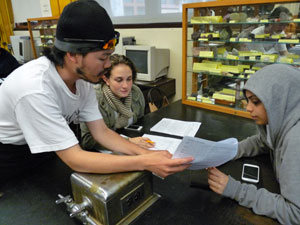
Other Support Services:
- Disabled Students Programs/Services (DSPS) -- Rosenberg Library, Room 323, on the Ocean Campus. Telephone: 415-452-5481 (V) 415-452-5451 (TDD) -- DSPS is the campus office responsible for verifying disability-related need for academic accommodations, assessing that need, and planning accommodations in cooperation with students and instructors as needed and consistent with course requirements. Students who need academic accommodations should request them from the DSPS.
- Counseling Department (Note: Counselor Anastasia Fiandaca is a good counseling resource if you aren't already working with a good counselor. She is especially experienced with environmental courses and programs and this class in particular. Phone: 415-239-3824)
- Learning Assistance Resource Center -- R207 -- 415.452.5502
- Virtual Campus Support
- CCSF City Online Student Support -- Additional information on learning online including information about minimum hardware and software requirements, FAQs about distance learning, Links to DSPS and CCSF resources, and a short self-evaluation that you can use to decide if online learning is right for you.
- Succeeding in an Online Course
READY TO GET STARTED?
If you are registered, then sign in to CANVAS for Week 1 details and requirements. The class will be available at least a week before the semester starts.